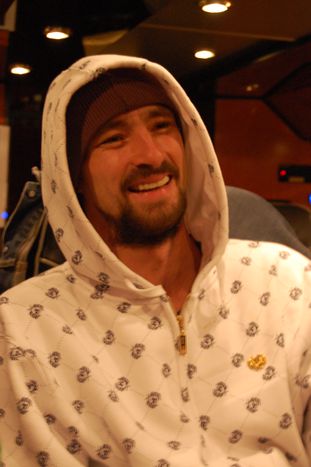
Tillman Otto: ‘People should burn if they wanna burn’
Published on
‘Gentleman’, 32, is a true reggae adherent and honorary Jamaican in German skin. His musical diaspora defines a pan-reggae notion of 'how small we all are in the jah jah world'
‘I couldn’t believe it and I still can’t believe it. I shared the stage with him a month ago.’ Gentleman is momentarily sombre as he remembers South African reggae giant Lucky Dube, murdered by carjackers on 18 October. The German reggae singer's voice sounds hoarse; he has just played to 4, 000 fans at the Zenith in northern Paris. He sits back in his tourbus, the beanie under his hood concealing his forehead expression. ‘We can’t just be stuck in this vicious circle of madness and violence. But it’s the nature of humanity.’
'The music itself hasn’t changed; there are more gunshots, more corruption in politics'
Early nineties Jamaica. A teenage Tillman Otto, hooked on his older brother’s reggae records, leaves school to backpack Jamaica, the peaceful ‘motherland of reggae,’ and thereby kick-starting a thirteen year career including six albums and chart hits such as Serenity. ‘The music itself hasn’t changed. But there are more gunshots, there’s more corruption in politics. Generations after generations might have a better world - we need to learn from our parents.’
Cologne to Kingston
Otto’s stay-at-home mum and pastor father Hans-Ulrich provided their children with an environment which he describes by inclining his head and levelling both hands in the air – stable. ‘I was a free kid. When my parents said allright it’s time to stop now, they couldn’t stop it. They were scared sometimes. But you have to rebel against your parents when you’re a child. The grass grow by itself as I am learning now,’ he says, referring to his six year-old son Samuel, who already ‘loves Beenie Man a lot.’
 The 'conscience of awareness’ that Otto developed on his personal journey to Jamaica 'was a mix between being curious about where the music came from and going somewhere to get a different objective about my own society.’ The abundance of producers, influence, creativity and studios in Kingston showed the then 17-year-old the inspiration that Germany or Europe was lacking about a music which 'made sense' to him. ‘In Kingston you can’t escape it. Everyone from the man at the gate got something to do with the music, you just need a raw idea. In Germany you have to know exactly what you do, and then it’s OK. There’s a certain mentality I have seen after over ten years in the business – reggae’s not cool no more. They may not like (Jamaican-American reggae artist - ed) Shaggy's music in Jamaica, but they are proud of it. In Germany, there’s too much analysing.’
The 'conscience of awareness’ that Otto developed on his personal journey to Jamaica 'was a mix between being curious about where the music came from and going somewhere to get a different objective about my own society.’ The abundance of producers, influence, creativity and studios in Kingston showed the then 17-year-old the inspiration that Germany or Europe was lacking about a music which 'made sense' to him. ‘In Kingston you can’t escape it. Everyone from the man at the gate got something to do with the music, you just need a raw idea. In Germany you have to know exactly what you do, and then it’s OK. There’s a certain mentality I have seen after over ten years in the business – reggae’s not cool no more. They may not like (Jamaican-American reggae artist - ed) Shaggy's music in Jamaica, but they are proud of it. In Germany, there’s too much analysing.’
Boxing and crossing gender and politics
It goes against reggae itself to try to categorise a man who renowned video director Ras Kassa amongst others hold as a model white ‘European’ who is well-received alongside native artists in Jamaica. ‘German, Caribbean, hip hop, soul, RnB – I don’t think in those categories – at all. We all have the same goals, just different perspectives. It’s globalisation right now. We need to go to a different level beyond French or German or English - we’re so small in the jah jah world.’ Despite denying displacement, Otto is adamant he'll never release a record in his native tongue. ‘Germany is the culture of philosophers. I love the meanings of some beautiful individual words, but I don’t like the sound of the language. If I sung in German I couldn’t release my album in sixteen countries.’
Gentleman's 'huge' names to look out for include Dutch supporting act Ziggi, Korean-German mentee Martin Jondo, and fellow compatriots Mellow Mark and dancehall act Mono and Nikitaman. But he also promotes the female voice in reggae. During the show, the man who started his career ‘singing background’ for hip hop band Freundeskreis gives the stage to each of his three backing soul singers, including long-term girlfriend Tamika of the Far East Band.
Reggae is the most social, political kind of music. It’s more rebellious, and has nothing to do with sunshine
'I live for my live shows,' Gentleman says of a troubled industry. 'People should burn if they wanna burn. Those in places like south America wouldn’t even have music if not for the internet - but we need to find a way so artists can live.' He has never subscribed to the red, gold, green and black-coloured reggae merchandise, opting to remain hatted than rasta-dreadlocked. ‘It’s all superficial. Reggae’s not on the outside, but the inside. People always have this cliché of sitting on a beach under a palm tree drinking rum, thinking what a peaceful lovely sunshine music I shot the sheriff it is,’ he laughs, breaking into song. ‘It's the most social, political kind of music. It’s more rebellious, and has nothing to do with sunshine.’
Where the sun don't shine
Nicolas Sarkozy’s name comes up twice to the roars of his crowd during the concert, rescheduled after a 24-hour strike disabled public transport in France. ‘It’s about the deal the man come up with,' he says of France's right-wing president. 'Gaddafi. From a democratic point of view, it’s very very dangerous – where are we gonna reach? Plus you see the man on the TV, and I feel like he’s a very good actor, the way how he talk.' Otto doesn't mince his words for German chancellor Angela Merkel either. 'She’s a very uninspired woman who might have some good ideas, but she’s a fake who don’t have no power. At the same time, I’m tired to blame politicians. It’s too easy.’
Turkey in the EU is a very thin line, but we should definitely move in this direction
Unlike the ‘Merkozy’ pair, Otto sees Turkey in the European Union. ‘It’s a very thin line, but we should definitely move in this direction.’ In June 2005, he collaborated with Turkish pop singer Mustafa Sandal on the single ‘Isyankar.’ On ZDF’s ‘Wetten Das’ TV programme, Sandal describes how he didn’t know who Gentleman was but ‘clicked’ with him when the unlikely pair met after Otto flew out to Istanbul - ‘one of my favourite cities along with Lisbon,’ recalls Otto. ‘I was working with a hero in Turkey. I felt the sound and I was like, yes, let’s do it. It was great for immigration, communication. After that, I ordered a doener in a Turkish restaurant, and the man said hey you’re Gentleman, you did that song with Mustafa - take it for free!’
Gentleman's tips for going out in Cologne
- Friday at the Petit Prince, Hohenzollernring, by Friesenplatz. They have a powerful sound system, there’s always jam sessions - and it’s been like that for ten years!
- Volksgarten and the African drumming during the summertime
Catch Gentleman on his 28-date European tour in Germany (3, 14, 15, 17, 19, 20, 26, 27, 28 November), Austria (21 November), Czech Republic (23 November), Poland (25 November) Holland (28 November)



